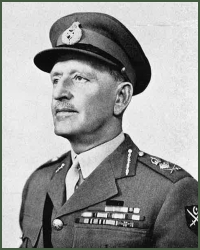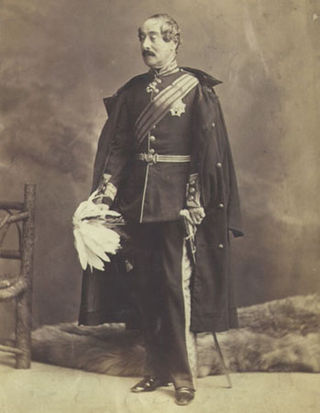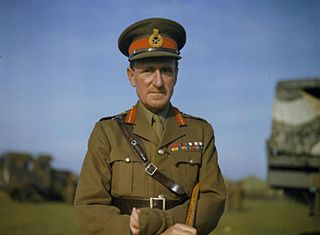Related Research Articles
General Sir Alexander Frank Philip Christison, 4th Baronet, was a British Army officer who served with distinction during the world wars. After service as a junior officer on the Western Front in the First World War, he later distinguished himself during the Second World War, where he commanded XV Indian Corps, part of Sir William Slim's Fourteenth Army, during the Burma campaign. He then went on to have a successful postwar career, and lived to the age of 100.
Samuel Hodge, VC was a West Indian soldier in the British Army and a recipient of the Victoria Cross, the highest award for gallantry in the face of the enemy that can be awarded to British and Commonwealth soldiers. From the island of Tortola in the British Virgin Islands, he was the second black man to be awarded the Victoria Cross after William Hall.

General Sir Douglas David Gracey & Bar was a British Indian Army officer who fought in both the First and Second World Wars. He also fought in French Indochina and was the second Commander-in-Chief of the Pakistan Army. Gracey held this latter office from 11 February 1948 until his retirement on 16 January 1951. Born to English parents living in India, he was educated in English schools before returning to India to serve in the military there.

Sir Alured Clarke was a British Army officer. He took charge of all British troops in Georgia in May 1780 and was then deployed to Philadelphia to supervise the evacuation of British prisoners of war at the closing stages of the American Revolutionary War. He went on to be Governor of Jamaica and then lieutenant-governor of Lower Canada in which role he had responsibility for implementing the Constitutional Act 1791. He was then sent to India where he became Commander-in-Chief of the Madras Army, then briefly Governor-General of India and finally Commander-in-Chief of India during the Fourth Anglo-Mysore War.

Sir Charles Hastings Doyle was a British military officer who was the second Lieutenant Governor of Nova Scotia post Confederation and the first Lieutenant Governor of New Brunswick.

Lieutenant General Gerard Corfield Bucknall, was a senior British Army officer who served in both the First and Second World Wars. He is most notable for being the commander of XXX Corps during the Normandy landings and the subsequent Battle of Normandy which followed in the summer of 1944.

Lieutenant General Sir Henry Knight Storks was a British soldier and colonial governor.

Field Marshal Sir John Michel was a British Army officer. He commanded the 6th Regiment of Foot during the Eighth Xhosa War in 1851 and served as Chief of Staff of the British Army's Turkish contingent during the Crimean War in 1854 before transferring to India where he commanded the Malwa Field Force which pursued Tatya Tope in the aftermath of the Indian Mutiny. He then commanded the 1st Division at the Battle of Taku Forts in August 1860 during the Second Opium War and took part in the burning of the Old Summer Palace at Peking in October 1860 as a reprisal for the torture and murder of British prisoners before being appointed Commander of British Troops in China and Hong Kong in 1861. He later commanded the forces in British North America playing a key role in the organization of the militia volunteers in resistance to the Fenian raids invasions in 1866. His last appointment was as Commander-in-Chief of Ireland in 1875.

Field Marshal Sir Frederick Paul Haines was a British Army officer. He fought in the First Anglo-Sikh War, in the Second Anglo-Sikh War and then in the Crimean War: during the latter conflict at the Battle of Inkerman, he held an important barrier on the post road guarding the approach to the 2nd Division camp for six hours. He served in India during the Indian Rebellion before becoming Commanding Officer of the 8th Regiment of Foot in the United Kingdom and then Commander of a Brigade in Ireland. He went on to be General Officer Commanding the Mysore Division of the Madras Army and then Quartermaster-General to the Forces in the United Kingdom. He returned to India to become Commander-in-Chief of the Madras Army in May 1871 and then Commander-in-Chief, India in April 1876: he commanded the forces in India during the Second Anglo-Afghan War and successfully argued for a large force being made available before mobilisation occurred, but once the war started the Governor-General of India, Lord Lytton, was inclined to by-pass Haines and deal direct with commanders in the field, causing friction between the two men.
Major General William Alfred Dimoline, was a senior British Army officer who saw service during the First and Second World Wars. His nickname was "Dimmy."

General Sir Bernard Charles Tolver Paget, was a British Army officer who served with distinction in the First World War, and then later during the Second World War, when he commanded the 21st Army Group from June to December 1943 and was Commander-in-Chief (C-in-C) Middle East Command from January 1944 to October 1946. He was the senior serving general in the British Army and, in Richard Mead's words, "he was possibly the most talented and well-qualified senior British general never to have held a top active service field command, but his contribution to the development of the Army during the War was nevertheless immense."

Major General Anton Muttukumaru, OBE, ED, ADC was the first native Ceylonese to serve as the Commander of the Ceylon Army, a post he held from 1955 to 1959. He also served as Ceylon's High Commissioner to Australia, New Zealand, Pakistan and Ambassador to Egypt.

General Abdul Hamid KhanHQA SPk SQA was a senior officer in the Pakistan Army. During the Indo-Pakistani War of 1965, he led the Pakistan 11th Division to victory in the Battle of Kasur. He served as the Chief of Staff of the Pakistan Army under President Yahya Khan and led the army during the Indo-Pakistani War in 1971. He is accused of inflicting genocide during the Bangladesh Liberation War.
Major-General Sir Edward Owen Fisher Hamilton was an officer of the British Army during the late 19th century. Originally a junior officer in the Queen's Royal Regiment, he oversaw signalling in the Indian Army during the late nineteenth century, before commanding a battalion and then a brigade in the South African War. He was later the commanding officer for Army forces in West Africa and Lieutenant Governor of Guernsey before retiring in 1914; on the outbreak of the First World War, he briefly returned from retirement to command a division in the New Armies.
George Abbas Kooli D'Arcy was a British soldier and colonial administrator. He was governor of the Gambia from 1859 to 1866, and governor of the Falkland Islands from 1870 to 1876.
Lieutenant-General Sir William Henry Goldney Baker was a British officer who served in the British Indian Army. Commissioned into the Indian Army in 1910, he served in France during World War I with the 34th Poona Horse and later the Cheshire Regiment, of which he was temporary commander of the 1st Battalion. Baker was mentioned in dispatches three times and awarded the Distinguished Service Order. In 1918 he fought the Marris in India with the 31st Duke of Connaught's Own Lancers. He then held a series of staff officer positions after the war before being promoted to lieutenant-colonel and receiving command of Probyn's Horse in 1935. He was promoted to the temporary rank of brigadier and commanded troops in action in Waziristan in 1936 and 1937, being again mentioned in dispatches. During World War II Baker was an aide-de-camp to King George VI and was promoted to the rank of lieutenant-general before retiring from military service in 1944.

Lieutenant General Sir Edward Cecil Bethune, was a British Army officer who raised and led his own regiment, Bethune's Mounted Infantry, in the Second Boer War and directed the Territorials in the First World War.
Alfred Burdon Ellis was a British Army officer and ethnographer, known for his writings on West Africa.
The military history of The Gambia spans from the earliest colonial contact in the 1500s through to the present day. Although it is currently one of the least militarized countries in the world, The Gambia has seen various colonial conflicts, and has contributed soldiers to Britain in World War I and World War II as part of the Gambia Regiment. Since independence in 1965, The Gambia has experienced various peacekeeping operations, as well as the 1994 military coup d'état and the 2017 ECOWAS military intervention.

Luke Smythe O'Connor was an Irish military officer and colonial administrator. He served as Governor of the Gambia from 1852 to 1859, and held senior roles in the Colony of Jamaica during the 1860s, including President of the Privy Council of Jamaica.
References
- ↑ Hart, H. G. (1846). The New Army List. London: John Murray. p. 154.
- ↑ "1857 Jamaica Almanac". Jamaican Family Research. Retrieved 1 September 2018.
- 1 2 Ellis, A. B. (1885). The History of the First West India Regiment. London: Chapman and Hall.
- ↑ Perfect, David (2016). Historical Dictionary of the Gambia. Lanham, Maryland: Rowman & Littlefield. pp. xxxii.
- ↑ "Lieutenant Colonel H. Anton". Imperial War Museum. Retrieved 1 September 2018.